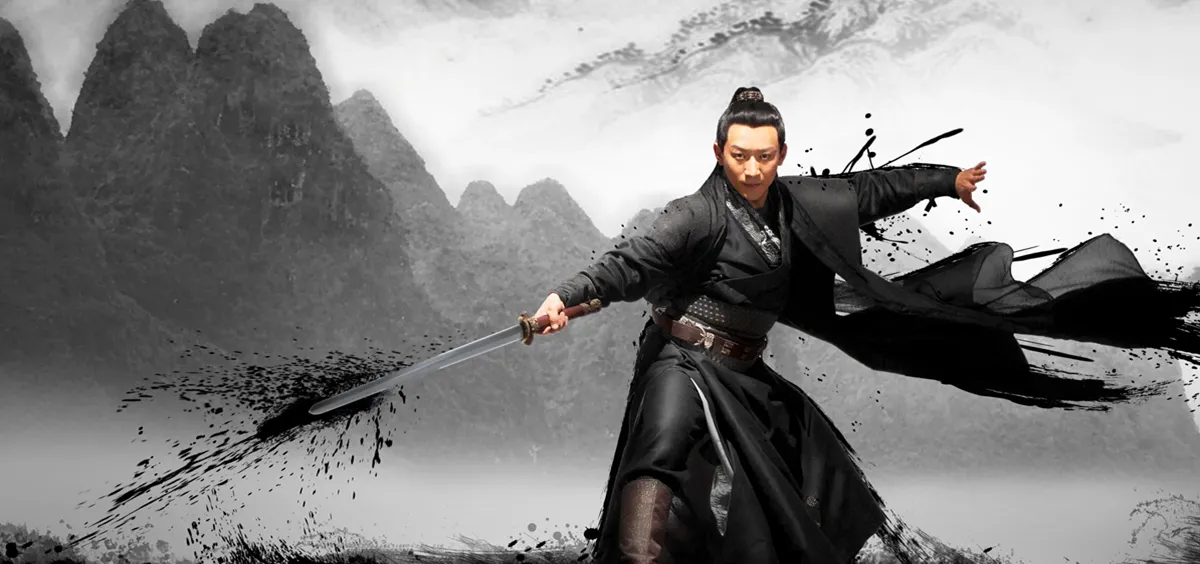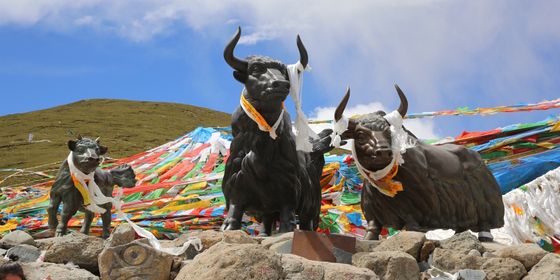Kung fu idioms for verbal fisticuffs
Choice Chengyu is a regular column, examining interesting, unique or newsworthy examples of chengyu—four-character idioms or proverbs, derived from historical and mythical events.
Almost 50 years on from his passing, the cultural power and popularity of Bruce Lee is undiminished. The kung fu master’s movies remain classics, his death still attracts speculation, and his image, instant recognizable, is still used—legally or not—by restaurants and brands throughout China. When people talk about Chinese martial arts, striking Lee’s iconic pose is often what comes to mind.
The martial art recognized as kung fu today has a history stretching much further back than Lee’s lifetime. Its origin has been traced to the Shang dynasty (established around the 1600 BCE) and Zhou dynasty (1046-256 BCE) when soldiers were required to practice martial arts together in order to improve morale. Ancient and more modern works such as The Water Margin (written in the 14th century) and Seven Heroes and Five Gallants (published in 1879) featured swordsmen and knight-errants who employed martial arts to curb evil and assist the weak. Later, martial arts inspired the literary genre wuxia, where kung fu skills are romanticized and infused with fantasy and the supernatural. These works often use chengyu to describe the martial arts skills of their heroes and villains, with many of these idioms now in everyday use. Today, on Bruce Lee’s 79th birthday, let’s learn some of these phrases.
飞檐走壁 Leap onto roofs and vault over walls
Kung fu comes in many forms, and in wuxia novels “轻功 (qinggong),” literally “light kung fu,” enables a master to leap to great heights, run at incredible speeds, and even fly. In movies, qinggong practitioners use their ability to climb walls and jump across rooftops to bamboozle and escape enemies, as summarized in this chengyu:
How could the thief just disappear at the end of this alley? He was able to leap onto roofs and vault over walls?
Xiǎotōu zěnme huì zài xiàngzi jìntóu tūrán xiāoshī le ne? Nándào tā néng fēiyán zǒubì ma?
小偷怎么会在巷子尽头突然消失了呢?难道他能飞檐走壁吗?
百步穿杨 Shoot an arrow through a willow leaf a hundred steps away
Bruce Lee was famous for his hand-to-hand combat, but the bow and arrow has been a common weapon for kung fu masters throughout history. This chengyu describes an excellent marksman, equivalent to calling them a “deadeye.” Records suggest that during the Warring States period (475-221 BCE), a man named Yang Youji was challenged by King Zhuang of Chu to shoot a dragonfly without killing it, which he managed by shooting an arrow through its left wing. Yang, it was said, could shoot a willow leaf from a hundred paces away without fail. Yang became famous for his martial arts skills, and this chengyu was born.
先发制人 Gain the initiative by striking first
Late wuxia writer Jin Yong observed that “in all the kung fu under the sun, only the fast are unbeatable (天下武功,唯快不破).” Perhaps he had the phrase 先发制人 in mind. Originating from the Book of Han, which recorded the history of the Han dynasty between 206 BCE–220 CE, this chengyu suggests that in any competition you should always strive to make the first move, striking preemptively if necessary.
He stole a march on his rival by announcing his candidacy first.
Tā xiānfā zhìrén, qiǎng zài duìshǒu zhīqián xuānbù cānyù xuǎnjǔ.
他先发制人,抢在对手之前宣布参与竞选。
眼疾手快 Quick of eye and deft of hand
In order to strike first, one must have excellent reflexes—a basic requirement for any kung fu master.
That policeman was so agile and swift that he caught the pickpocket red-handed.
Nà wèi jǐngchá yánjí shǒukuài, dāngchǎng jiù bǎ xiǎotōu zhuāzhù le.
那位警察眼疾手快,当场就把小偷抓住了。
刀枪不入 Impervious to spear thrusts and sword cuts
In a fight, defense is just as important as attack. In wuxia novels this chengyu refers to someone somehow invulnerable to any attack. Nowadays, the phrase can sometimes describe those who are extremely stubborn and never listen to others’ opinions.
He is only flesh and blood. How can he be invulnerable?
Tā yě búguò shì xuèròu zhīqū éryǐ, zěnme kěnéng dāoqiāng búrù?
他也不过是血肉之躯而已,怎么可能刀枪不入?
以柔克刚 Use softness to conquer hardness
A full-frontal assault is not always the best solution. Sometimes, even kung fu masters need to take a more nuanced approach to combat. As a saying goes: “[by clever maneuvers], four liang (a unit of weight, approximately 50g) can overcome a thousand jin (500g).” Tai chi is a form of kung fu that applies this principle. In many movies, skillful tai chi masters move slowly and softly, but can defeat rivals much bigger and tougher than them.
Sometimes, you shouldn’t confront toughness with toughness. You’d better learn to use softness to conquer hardness.
Yǒu shíhou zuòshì búnéng yìng pèng yìng, yào xué huì yǐ róu kè gāng.
有时候做事不能硬碰硬,要学会以柔克刚。
炉火纯青 The stove fire has turned pure blue
Originally, this chengyu described the process of Daoist priests making pills of immortality. When the flame in the stove becomes pure blue, the pills are ready. In wuxia novels, this term is often used to suggest that a kung fu master has reached perfection in their grasp of a particular martial art. It can also be used in other fields to suggest that someone has a high degree of technical or professional proficiency.
She has attained perfection in acting.
Tā de yǎnjì yǐjīng dào le lúhuǒ chúnqīng de dìbù.
她的演技已经到了炉火纯青的地步。
登峰造极 Reach great heights
Originally meaning reaching the peak of a mountain, this chengyu now also describes someone who has reached the peak of perfection, whether in martial arts or other professions.
His painting skills have reached the peak of perfection.
Tā de huìhuà shuǐpíng kěwèi dēngfēng zàojí.
他的绘画水平可谓登峰造极。
Cover image from VCG












